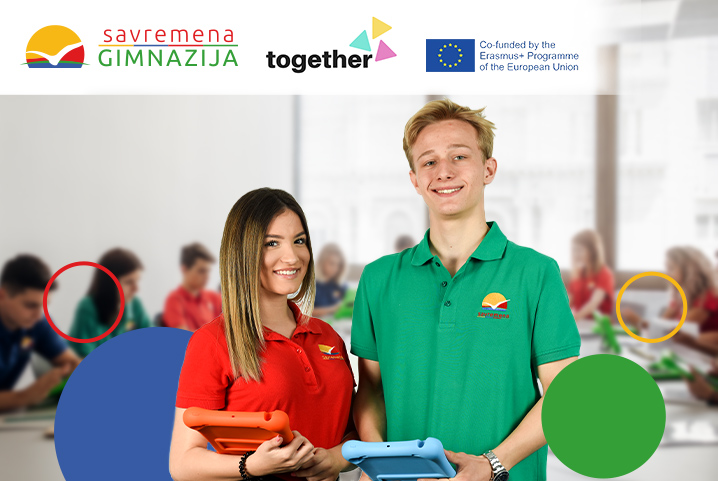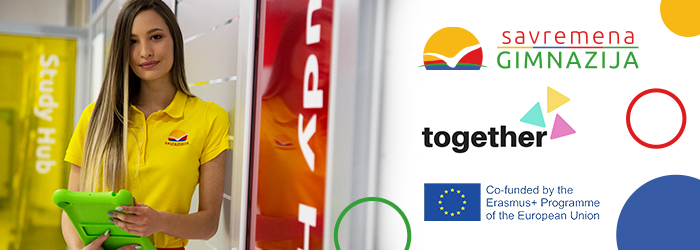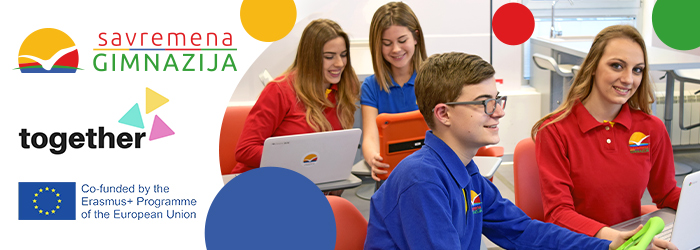
This school year, Savremena Gimnazija has successfully completed numerous international projects, ending on a high note by launching the Erasmus+ project TOGETHER.
The goal of this international project is to develop an innovative methodology to engage secondary school students in community-based participative activities for the digitization, enhancement and protection of cultural heritage, in accordance with the principles of service-learning and project-based learning.

What are the reasons for launching this project?
The dramatic impact of the COVID-19 emergency has put an unprecedented pressure on the cultural and creative sector across Europe, unveiling the need for higher attention, resources and a process of modernization that should first and foremost be sparked from the young generations. The discussion around digital transformation of cultural resources has been around for years now, although it has still not led to the significant impact expected. Now, the aftermath of the pandemic demands for a clear acceleration, that is going to be effective only if remarkable investments are made to provide the necessary skills and competences to the future professionals in this sector.
Teachers have a crucial role in supporting learner development and are key change agents in school development. The European Commission report encourages the transformation of schools into “open learning organisations”, enabling teachers and school leaders to improve both their pedagogical and their organisational practices concurrently through local collaborative research, networking and continued professional development.
What is service-learning?
Service-learning means to create a link between students' learning objectives and actual needs from the community they are living in, therefore literally taking learning out of the classrooms and into real life. At Savremena, this concept has been successfully implemented through the “classroom without walls concept” that encourages the creative and academic development of students outside the classroom.
Service-learning differs from community service because it is not sporadic or made on a voluntary basis, but systematic and included in the school's syllabus, developed in a close and long-term relationship with the community's stakeholders.
Students will be encouraged to commit to the needs of their community bringing their learning outside of the classrooms so as to develop a sense of responsibility towards society. The Recommendation on Key Competences for Lifelong Learning, adopted by the EU Council on a Commission’s proposal, identifies 8 key competences needed for personal fulfilment, a healthy and sustainable lifestyle, employability, active citizenship and social inclusion. Among them, there are active citizenship, cultural awareness and expression, entrepreneurship, digital and technology-based competences. All of these are brought into the equation of the TOGETHER concept, that although mainly addresses the disciplines of humanities, hold a clear and necessary multidisciplinary vocation.

What are the expected results of the project?
Teacher’s Handbook and Competence framework
The Handbook will be a meaningful pedagogical resource made available for the Continuous Professional Development (CPD) of secondary schools’ teachers and leaders, providing them with an innovative educational model that leverages on digital creativity skills to formulate concepts of service-learning and project-based learning aimed to involve students in initiatives for digital enhancement of local cultural heritage.
TOGETHER Digital Creativity Academy
The Academy will be an online educational platform that will host the digitized version of the Handbook with a collection of tools, instructional materials and multimodal resources complementary to the Handbook. The aim will be to create an open online environment that will be useful for secondary school teachers and leaders and enhance their learning experience. The Academy will also serve the purpose to create a social hub between all users scattered across the EU, thus leading to the formation of a community of practice.
Project participants
Apart from Savremena Gimnazija, partners in the project include seven more participants from Germany, Portugal, Serbia, Bulgaria, Cyprus, Belgium, Spain and Italy, whom we met online for the first time on the 27th of May to establish first contacts and to share the next steps and responsibilities.
We are looking forward to continuing this project and having the opportunity to contribute to the global cultural heritage and conveying examples of our successful educational practices to our European partners.

















